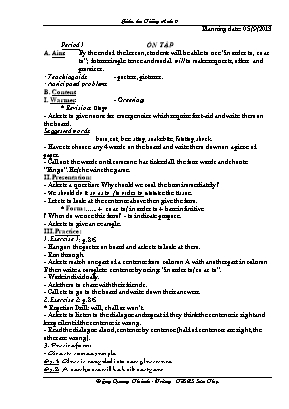Giáo án Tiếng Anh 9 Period 1: Ôn tập
Bạn đang xem tài liệu "Giáo án Tiếng Anh 9 Period 1: Ôn tập", để tải tài liệu gốc về máy bạn click vào nút DOWNLOAD ở trên

Planning date: 05/9/2013 Period 1 ÔN TậP A. Aim: By the end of the lesson, students will be able to use “in order to, so as to”; future simple tense and modal will to make requests, offers and promises. Teaching aids: - posters, pictures. Anticipated problems: B. Content: I. Warmer: - Greetings * Revision: Bingo - Ask sts to give nouns for emergencies which require first-aid and write them on the board. Suggested words: burn, cut, bee sting, snake bite, fainting, shock. - Have sts choose any 4 words on the board and write them down on a piece of paper. - Call out the words until someone has ticked all the four words and shouts: “Bingo”. He/she wins the game. II. Presentation: - Ask sts a question: Why should we cool the burn immediately? - We should do it so as to /in order to minimize the tissue. - Let sts to look at the sentence above then give the form. * Form: ...... + so as to/ in order to + bare infinitive. ? When do we use this form? - to indicate purpose. - Ask sts to give an example. III. Practice: 1. Exercise 1: p.86. - Hang on the poster on board and ask sts to look at them. - Run through. - Ask sts match one part of a sentence from column A with another part in column B then write a complete sentence by using: “in order to/ so as to”. - Work individually. - Ask them to share with their friends. - Call sts to go to the board and write down their answers. 2. Exercise 2: p.86. * Repetion Drill: will, shall or won’t. - Ask sts to listen to the dialogue and repeat if they think the sentence is right and keep silent if the sentence is wrong. - Read the dialogue aloud, sentence by sentence. (half of sentences are right, the other are wrong). 3. Passive form: - Give sts some example. Ex.1: Glass is recycled into new glassware. Ex.2: A new house will be built nest year - Let sts to look at them. ? Which tense is it? - passive form. ? Who can give the form? Form: a/ Passive form in simple present tense: S + be + PII + by + O a/ Passive form in future simple tense: S + will be + PII + by + O ? How to use this form? - It is used when the subject is affected by the action of the verb. 2. Adjective + a noun clause/ Adjective + to infinitive: - Example: + It’s difficult to follow your directions. + We are delighted that you are passed exam. - Have sts to look at the sentences above to give the form. Form: a/ Adjective + a noun clause. b/ Adjective + to infinitive. - Get sts to copy. 4. - Write xamples on board: +The boy reading the book is Ba +The old lamp made in China is five dollars - Let sts look at the sentences and ask: ? What’s the differences between them? - Ask them give the form. Form: a/ S + V-ing (present participle) b/ S + V-ed (past participle) Use: - A present participle (phrase) can be used as an adjective to qualify a noun with active meaning. - Apresent participle (phrase) can be used as an adjective to qualify a noun with passive meaning. - Get sts to copy. IV. Homework: V. Remarks:
Tài liệu đính kèm:
 on tap.doc
on tap.doc





